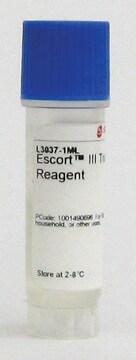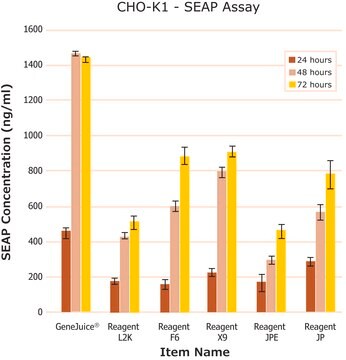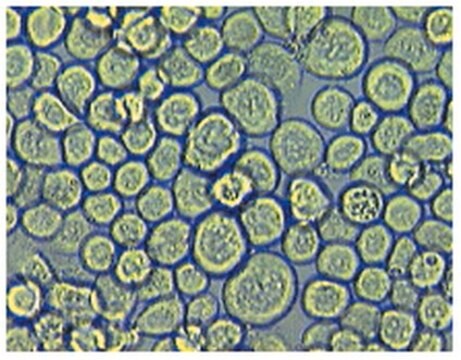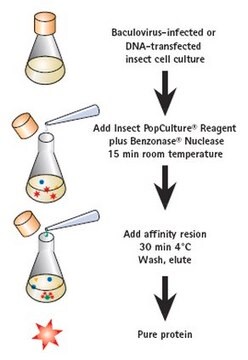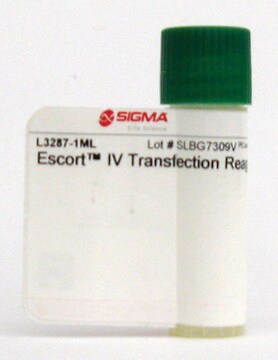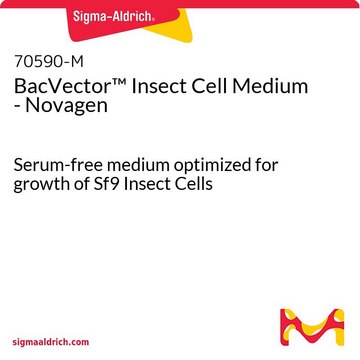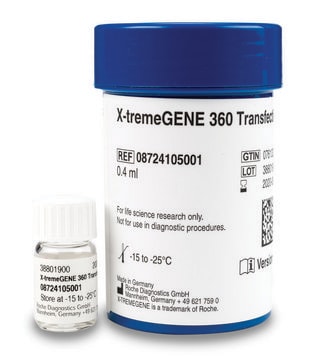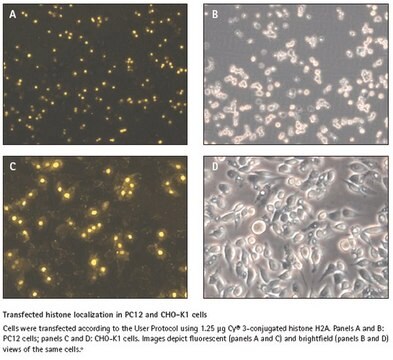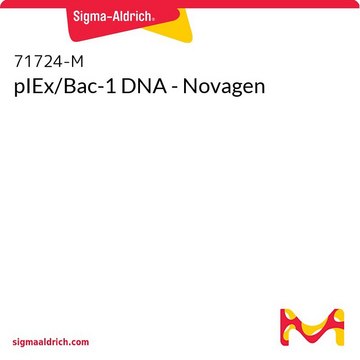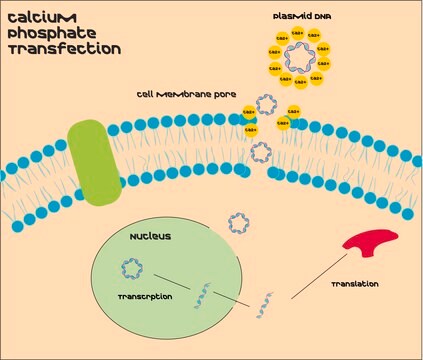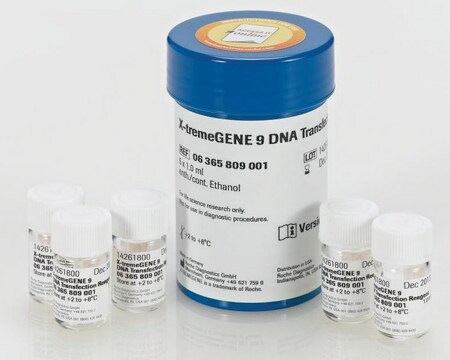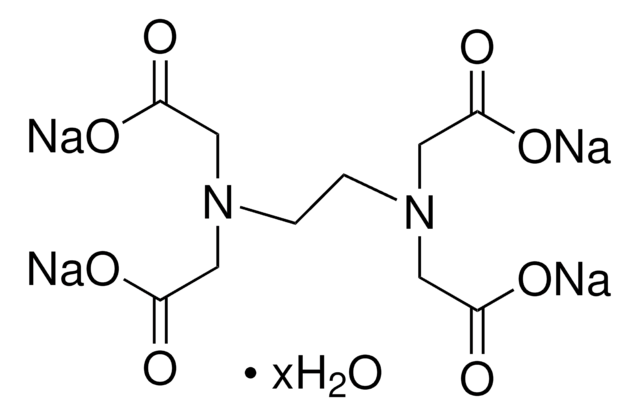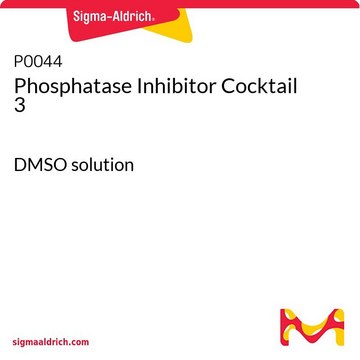71259
Insect GeneJuice® Transfection Reagent
Proprietary liposome transfection reagent optimized for maximal transfection efficiency of Sf9 insect cells for baculovirus protein expression.
Synonym(s):
GeneJuice Transfection
Sign Into View Organizational & Contract Pricing
All Photos(1)
About This Item
UNSPSC Code:
41106502
NACRES:
NA.54
Recommended Products
Quality Level
form
suspension
manufacturer/tradename
Novagen®
storage condition
OK to freeze
technique(s)
transfection: suitable
shipped in
wet ice
storage temp.
2-8°C
General description
Insect GeneJuice<TMSYMBOL></TMSYMBOL> Transfection Reagent is a proprietary liposome formulation optimized for maximal transfection efficiency of Sf9 insect cells. The reagent features extremely low toxicity to the cells and can be used for both transient and stable transfections in serum-containing or serum-free media, and for cotransfection of transfer plasmids with linearized virus DNA for the production of recombinant baculoviruses. Insect GeneJuice is ideal for large-scale protein expression in suspension-culture transfections of Sf9 insect cells when using pIEx<TMSYMBOL></TMSYMBOL> and pBiEx<TMSYMBOL></TMSYMBOL> vectors, which contain the immediate early baculovirus promoter, IE1.
Insect GeneJuice Transfection Reagent is provided as a 2 mg/ml suspension in 20 mM MES, 150 mM NaCl, pH 6.2 buffer. One ml is sufficient for 12 or 125 transfections in 10-ml suspension culture flasks or 35-mm plates, respectively.
- When Insect Genejuice® used in conjunction with Sf9 cell line, raw relative light units (RLUs) from Renilla Luciferase expression with plex is 131,90 Vs. 75,726 when other reagent used with Sf9, thus 1.7 fold difference.
- When Insect Genejuice® used in conjunction with Sf9 cell line, raw relative light units (RLUs) from Renilla Luciferase expression with plex is 131,90 Vs. 11,952 when other reagent used with High Five, thus 11 fold difference.
- When Insect Genejuice® used in conjunction with Sf9 cell line, raw relative light units (RLUs) from Renilla Luciferase expression with plex is 131,90 Vs. 31,897 when Insect Genejuice used with High Five, thus 4.1 fold difference.
Insect GeneJuice Transfection Reagent is provided as a 2 mg/ml suspension in 20 mM MES, 150 mM NaCl, pH 6.2 buffer. One ml is sufficient for 12 or 125 transfections in 10-ml suspension culture flasks or 35-mm plates, respectively.
Warning
Toxicity: Standard Handling (A)
Legal Information
GeneJuice is a registered trademark of EMD Biosciences, Inc., Madison, WI USA
GENEJUICE is a registered trademark of Merck KGaA, Darmstadt, Germany
NOVAGEN is a registered trademark of Merck KGaA, Darmstadt, Germany
Storage Class Code
12 - Non Combustible Liquids
WGK
WGK 1
Flash Point(F)
Not applicable
Flash Point(C)
Not applicable
Certificates of Analysis (COA)
Search for Certificates of Analysis (COA) by entering the products Lot/Batch Number. Lot and Batch Numbers can be found on a product’s label following the words ‘Lot’ or ‘Batch’.
Already Own This Product?
Find documentation for the products that you have recently purchased in the Document Library.
Customers Also Viewed
A M Al-Sulaiman et al.
Saudi journal of biological sciences, 24(7), 1497-1504 (2018-10-09)
Several prokaryotic and eukaryotic expression systems have been used for in vitro production of viruses' proteins. However eukaryotic expression system was always the first choice for production of proteins that undergo post-translational modification such as glycosylation. Recombinant baculoviruses have been
Guillermo H Sguazza et al.
Revista Argentina de microbiologia, 45(4), 222-228 (2014-01-10)
Equine influenza virus is a leading cause of respiratory disease in horses worldwide. Disease prevention is by vaccination with inactivated whole virus vaccines. Most current influenza vaccines are generated in embryonated hens' eggs. Virions are harvested from allantoic fluid and
Tilen Vidmar et al.
Protein expression and purification, 91(1), 69-76 (2013-07-23)
Trop2 is a stem/progenitor cell marker, which is also upregulated in several human carcinomas. The largest part of the molecule, recognized by several monoclonal antibodies, is represented by the extracellular part (ectodomain) and is composed of three modules. The aim
Kinda Alshaikhahmed et al.
Vaccine, 34(8), 1103-1108 (2016-01-26)
Epizootic haemorrhagic disease virus (EHDV) is an insect-transmitted pathogen which causes high mortality in deer populations and may also cause high morbidity in cattle. EHDV belongs to the Orbivirus genus and is closely related to the prototype Bluetongue virus (BTV).
Frauke Hussmann et al.
Scientific reports, 6, 20653-20653 (2016-02-13)
Alp14 is a TOG-family microtubule polymerase from S. pombe that tracks plus ends and accelerates their growth. To interrogate its mechanism, we reconstituted dynamically unstable single isoform S. pombe microtubules with full length Alp14/TOG and Alp7, the TACC-family binding partner
Our team of scientists has experience in all areas of research including Life Science, Material Science, Chemical Synthesis, Chromatography, Analytical and many others.
Contact Technical Service